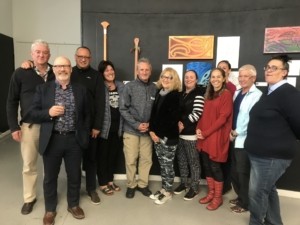
Dr Patrick McHugh of Mātai Research, EIT chief executive Chris Collins, Toihoukura professor Ahorangi Derek Lardelli, Rose Gould-Lardelli, EIT School of Business lecturer Dr Steve Hinge, EIT health science tutor Cherie Te Rore, EIT School of Nursing lecturer Lauren Hindmarch, Mātai chief operating officer Leigh Potter, Social work lecturer Rehia Whaanga, Toihoukura associate professor Steve Gibbs and Toihoukura head of school Dayle Takitimu.
A growing level of research activity in the Tairāwhiti region was celebrated in EIT’s Maia Gallery at Toihoukura this week, with the first in a series of evening lectures.
Kicking off the series with an inspiring presentation on their work in community health were Mātai research representatives Dr Patrick McHugh and chief operating officer Leigh Potter, whose presentation inspired and challenged EIT academics.
They talked about the research Mātai was doing here in Tairāwhiti, focusing on conditions that were disproportionately affecting Maori people.
People in this region died 10 years earlier than the rest of New Zealand and Maori people died even before that, said Leigh Potter.
As a medical imaging technologist, it was this that had inspired her to join Mātai research. She had just diagnosed five cases of breast cancer and three of the women affected were Māori.
“The Government wanted us to do more in the area of prevention but I wondered what prevention looked like,” she said.
When she met Dr Samantha Holdsworth and learned about the research work she was leading in Gisborne, she decided to join her team.
Apart from having some of the worst health statistics in the country, Gisborne was a great place to live, it had a stable community and it had good network links to experts and technology elsewhere.
Mātai’s network included 24 affiliated faculty advisers, 37 medical, scientific and engineering advisers from around the world, and tikanga Māori advisers, she said.
“Internet makes research possible in any location.”
Mātai would also be in research collaboration on community health initiatives with Ngati Porou Hauora and Turanga Health.
The goal of Mātai’s research work was to enable early diagnosis leading to early and effective treatment.
Dr McHugh said work already done locally highlighted the importance of the first 1000 days of a child’s life, with evidence showing the experiences a child had then directly affected health outcomes in adulthood.
It showed that brain development in the first 1000 days was improved if the child had a loving relationship with one caregiver.
Research into issues of equality and equity had shown the need for a social laboratory to address social challenges.
There was a need to study, plan and act.
The Mātai research initiatives were being supported by various agencies, including the provincial Growth Fund and ECT.
School of Business lecturer Dr Steve Hinge outlined his research, which showed that contrary to good experiences in a person’s first 1000 days, crucibles – or hard life experiences – in later life actually enhanced people’s leadership capabilities.
He had done this project for his PhD thesis and the results continued to permeate his work throughout his career.
Extensive interviews and analysis of 20 leaders from throughout the Northland community had shown clearly that tough experiences – such as the death of a loved one, relationship issues, financial, employment or family difficulties – made people more resilient and tenacious.
It gave them a clearer sense of calling, developed their character and competence, enhancing their leadership capability.
“I discovered that these crucible experiences made people more aware of their purpose and motivated them to be the best they could be.”
The people he had interviewed were more inclined to use their own skills than call in expertise. Bad experiences had improved their self-awareness and ability to communicate.
“I discovered that lessons from life are lessons for life,” he said.
From this, he had coined the word “surthrive”.
Other lecturers, including School of Nursing lecturer Lauren Hindmarsh, Social Work lecturer Rehia Whaanga and Health Science tutor Cherie Te Rore, had done projects centered on optimising the learning capacity of students, all of which were leading to beneficial outcomes for EIT.
Encouraging research was an important activity for EIT, said chief executive Chris Collins.
”It encourages our tutors and students to ask questions and build a deeper understanding of what they are doing,” he said.
He acknowledged the work Toihoukura was doing in encouraging this component of learning.
Toihoukura tutor Erena Koopu highlighted this approach with a presentation about the research work that underpinned her exhibition Hei o Mo Apanui, which depicted the stories and history of her people.
She did this by studying the lyrics for kapa haka performances by composer Rikirangi Gage and tried to portray the wairua (spirit) of these songs in her art works.
This combined her passions for her people and their stories, kapa haka and art, which was extremely well received by all who came to view the exhibition.
Toihoukura Head of School Dayle Takitimu read a poem highlighting the interweaving of Te Ao Māori experience with that of technology, an issue touched on by several tutors.
The evening was the first of a series aimed at greater collaboration between researchers.
